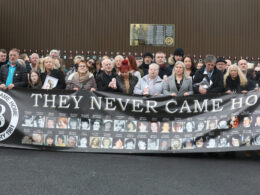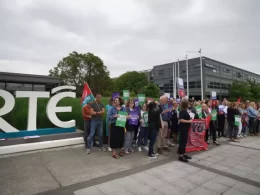By Donal Devlin
“The choice of the Irish people is clear: they want more of the same”. This was the immediate and typically superficial reaction from Irish Times political editor Pat Leahy about the outcome of the general election in Ireland. Much of the establishment media followed suit. Similarly, Fianna Fáil (FF) and Fine Gael (FG) are interpreting the election results as an endorsement of their political record and policies. The facts point to a different reality.
Government parties’ support drops
The two parties received a combined vote share of 42.7%, their lowest combined vote ever. Despite gaining seats, this was Fianna Fáil’s second worst result in its history, only outperforming the drubbing it received in 2011 following the economic crash. Furthermore, turnout for the general election was under 60% – the lowest since 1923. Lower turnouts generally skew results in favour of the establishment while at the same time undermining any claims of broad, enthusiastic support.
It was a particularly poor election for Fine Gael, given the overhyped expectations typified by the ubiquitous poster of Simon Harris with the slogan “A New Energy”. It didn’t take long for the mask to slip. Harris’ dismissive encounter with Charlotte Fallon, a Section 39 care worker in Kanturk, Co.Cork, one week before polling day, exposed their arrogant contempt for working-class people again. The video of this encounter quickly went viral. It followed another incident at the beginning of the campaign where FG members and supporters laughed and applauded as Ryanair CEO Michael O’Leary mocked teachers, and implicitly all public sector workers, at the launch of a FG candidate.
The Green Party retained just one seat out of 12, with leader Roderic O’Gorman now the lone Green TD – taking the fifth seat in the five-seat constituency of Dublin West. The Greens are following a well-trodden path (one they’ve been down before) of “centre-left” parties being politically punished for coalescing with Fine Gael and Fianna Fáil and betraying the aspirations of their voters. Weeks before the election, the party gave the go-ahead to the Planning and Development Bill that designated liquefied natural gas (LNG), a gas extracted from the destructive practice of fracking, as “strategic infrastructure”. It was indicative of the Green Party’s failure in government to seriously address CO2 and other toxic emissions, with Ireland set to miss its legally binding targets by some distance.
Simmering discontent
There is massive anger and discontent in working-class communities around the decade-long housing crisis, the disgraceful underfunding and lack of resources for services for disabled and autistic people, and the crumbling health and other public services. During the election, health workers balloted for industrial action to oppose the effective recruitment embargo in the public health system. While inflation figures may have fallen, working-class people are still being hit by the continuing cost of living crisis, which not surprisingly was one of the key issues for voters in the election.
The Government’s so-called “giveaway budget”, in the context of major corporate tax receipts and the €14 billion Apple Tax award (which it spent €10 million in legal fees trying to help Apple Inc. keep), failed to win over working-class voters. This Budget took the form of once-off social welfare payments. The Government refused to invest the wealth in long-term sustainable public services. This is linked to its commitment to a neo-liberal orthodoxy that ideologically opposes public investment to meet people’s needs.
The level of alienation and discontent found a desperate expression in the vote obtained by the gangland criminal Gerry Hutch in Dublin Central, who narrowly missed out on taking a seat, but it also spoke to a broader mood of despondency. There is a lack of a generalised fightback in society on the key issues affecting working-class people. There was a real sense that change was not on offer and that FF and FG were likely to return to office. This was in contrast to the last two general elections of 2016 and 2020. The former took place against the backdrop of the water charges movement that resulted in important gains for the socialist left and a real blow to the austerity agenda. The latter took place against a surge in support for Sinn Féin. Many hoped they could break the rule of 100 years of FF and FG dominance and begin to resolve issues such as the chronic lack of affordable homes to rent or buy.
Far right stalled
The last number of years has seen the emergence of a vocal and organised far-right movement in Ireland. Fortunately, they failed to make the gains many feared they would a year ago after the racist riots in Dublin City Centre or the local elections in June when five far-right candidates won council seats. Their poisonous and divisive attempts to scapegoat migrants and asylum seekers for the housing and other crises in society were not able to gain the same traction in the context of there clearly being no shortage of wealth and resources to pay for decent homes and services for all. Some far-right candidates did get respectable votes, which is a warning that anti-racist and anti-fascist forces must heed. They haven’t gone away by any means and will no doubt regroup and seek to exploit any economic downturn and the austerity that will come with it.
The shift to the right by all the main parties and the fact that a number of racist right-wing populists were elected, such as those in Independent Ireland and Aontú, is indicative of this danger. Combined with stirring up racism, these forces are also trying to whip up a disgusting “moral panic”, notably vilifying the trans and queer community. This must be actively opposed in the months and years ahead.
Sinn Féin won’t be in government
Sinn Féin (SF) made a breakthrough in 2020 to become the largest party (by vote share) in the South for the first time. But it has failed since then to use its 37 TDs to organise a fight for change that could inspire workers and young people. Instead, it acted as a tame opposition, eager to prove its credentials to the capitalist establishment. Its leaders met with multinationals, assuring them that Ireland’s status as a tax haven would remain in place; they increasingly rolled back on support for military neutrality and shamefully shook hands with Joe Biden in the context of the Gaza genocide. Their key housing policy fell short of what’s needed and relied on profit-hungry developers to build 70% of homes. They were unwilling to advocate for a state-owned construction company that would end the rule of the profiteers in the construction sector. At most, they put forward the idea of such a company operating in Dublin.
In the context of a rise of racism and the far-right, SF also disgracefully leaned into anti-refugee sentiment. Examples of this dog whistle politics were the constant insistence by SF TDs that they opposed the Irish State’s non-existent “open borders”, and that they would ensure that no accommodation centres would be placed in working-class areas. Such rhetoric had the effect of legitimising and boosting the far right, including at SF’s expense – particularly in the local elections. To a large extent, SF’s failure to act as a fighting left opposition inside and outside the Dáil created the space for the far-right to rise.
All of this created a sense of disappointment amongst those who had voted for them in 2020 and a falloff in support from consistently polling in the mid-thirties to receiving just 12% in the June elections and recovering to just 19% in this election – 5% (117,000 votes) below its 2020 result. It did, however, gain two seats, but it was forced to accept that it would remain in opposition rather than in government. This is not because SF doesn’t want to join a government with FF, indeed, it has pleaded with FF to hold talks, but because FF is outright refusing to discuss with SF.
Mick Barry narrowly misses out
The feeling that no alternative was on offer, combined with the fact that large parts of the trade union movement have become increasingly irrelevant and docile, not giving a lead and organising to fight on issues like the housing or cost of living crisis, meant that this was a challenging election for the socialist left. It had an impact on voter turnout, and there were less interactions on the doors owing to a flat mood. All of the People Before Profit and Solidarity TDs received fewer votes than in 2020.
This was the context in which Socialist Party and Solidarity member, and candidate for the People Before Profit-Solidarity united left Dáil challenge, Mick Barry, narrowly lost his seat by an agonisingly close margin of 35 votes in Cork North Central – the narrowest margin of any candidate in the state. The redrawing of the constituency significantly impacted on our chances of winning the seat with the addition of Mallow and Ballincollig, particularly when this took place only a year out from an election. The loss of Mick’s seat is a real setback for the working class in Cork North Central and beyond. Under challenging circumstances, we waged an excellent campaign with a youthful team of 124 volunteers. We put forward a fighting socialist programme in our leaflets, posters and social media.
We reached tens of thousands of people with posts on the key issues impacting the lives of working-class and oppressed people, such as housing, dereliction, Cork City’s crumbling bus services, LGBTQ rights and opposition to racism and the far-right. In Cork City itself, we campaigned on a programme for a Northside Action Plan to end the disgraceful neglect of the working-class communities of the Northside. Mick and Socialist Party councillor Brian McCarthy have been to the fore in fighting against the scandal of dirty, discoloured and potentially dangerous water. This was brought about after a for-profit contractor hired by Irish Water was hired to design, build and operate the new Lee Road waterworks.
The endorsements our campaign received were a testament to Mick’s record as a fighter for the working class and oppressed. These included Valerie Conlon, the shop steward and chief spokesperson for the former Debenhams workers in Cork; Suzanne O’Flynn, chairperson of the parents committee at St Killian’s Special School in Cork City; and Christine Mullins, a key organiser who fought to keep the childcare centre ‘Before 5’ open. These are some of the working-class campaigners who Mick and the Socialist Party have actively assisted and organised alongside. We also received the endorsement of prominent LGBTQ campaigner and Drag Queen, Krystal Queer, reflecting the fact that Mick was one of the most prominent voices in the last Dáil for trans healthcare and rights.
Ruth Coppinger regains seat
Socialist Party and Solidarity member Ruth Coppinger regained the seat she narrowly lost in 2020, taking the fourth seat in the five-seat Dublin West constituency. Ruth’s campaign, which focused on issues of disability justice, housing, workers’ rights, and socialist feminist change, was supported by many disabled activists and parents of autistic children.
10,000 copies of a special leaflet from Ruth was distributed on the issue of gender violence, justice for survivors, healthcare access and equality for women and the trans community, and was especially well received. Alongside ROSA – Socialist Feminist Movement, Ruth’s role in organising a march in Dublin City Centre to the DPP’s office to thank Nikita Hand for her brave stance and to demand justice for all survivors was commented upon widely in the final days of the campaign, solidifying the sense that Ruth – a socialist feminist fighter and an unwavering voice for survivors – needed to be back in the Dáil.
Notably, many different minority communities who are a vital part of the diverse Dublin West constituency – those suffering at the coal face of rising racism and of the housing and health crises, both as workers and as those who are disproportionately housing insecure – was where Ruth’s campaign won significant new support.
The Dublin West Palestinian community that Ruth has worked within the local campaign against the genocide in Gaza and the Sudanese community,who are also very active against genocide, mobilised in their communities to support Ruth’s socialist and anti-racist, anti-colonialist candidature.
Ruth’s canvassing team was bolstered by her colleagues in struggle in the animal rights movement, especially the incredible NARA campaign, by activists inside the trade union movement, especially militant rank-and-file workers in Unite, and also by her siblings in ROSA – Socialist Feminist Movement. This, plus the Dublin West community activists from all over the constituency, added enormously to Ruth’s campaign.
A challenging election for the left
Unfortunately, People Before Profit’s (PBP) Gino Kenny lost his seat in Dublin Mid-West, and Cllr Hazel de Nortúin missed out on retaining outgoing TD Bríd Smith’s seat in Dublin South-Central. However, it is worth noting that PBP-Solidarity received 2.8% of the national vote, gaining respectable votes in areas where it ran very limited campaigns. It is very welcome that Paul Murphy and Richard Boyd Barrett of PBP retained their seats.
Particularly in the context of a low turnout, left parties and independents such as Thomas Pringle and Joan Collins, who also lost seats, were squeezed by other forces, including SF, the Social Democrats and even Labour. In such circumstances, PBP’s continued emphasis on abstractly calling for a ‘left government’ and an ‘end to 100 years of Fianna Fáil and Fine Gael rule’, by advocating an alternative coalition involving SF, the Social Democrats, Labour and PBP, without sufficiently pointing to what such a left government would and should do, or the real political limitations of the other forces, served to steer people in their direction – including likely at the expense of PBP itself.
As we have pointed out before, this is a mistaken approach that can mean that the socialist left will not cut itself out in a manner that will result in winning support away from SF, the much bigger party that people looking for an alternative to FF / FG will naturally go to. Pointing out their willingness to go into coalition is not enough – the fact that they accept a status quo built on inequality and injustice is a fundamental problem.
Labour and Social Democrats boosted
This is also true of Labour and the Social Democrats, who made important gains in this election. Their vote shares only increased marginally, but they both nearly doubled their number of seats. Of course, these parties should be pressured to rule out coalition with FF and FG, and commit to fight to build a real left opposition that breaks with the logic of the capitalist market and economic dominance of the super-rich and big business. This system has proven incapable of providing public housing, health, education and disability services in a period of economic growth; at best it delivered only relative stability that has benefited big business and to a lesser extent, sections of the middle class and better-paid workers. A programme of simply tinkering with the system will not deliver real change now, and it will certainly not do so in the context of an economic crisis that Ireland is clearly vulnerable to.
Unfortunately, however, this is an outlook to which SF, Labour and the Social Democrats are firmly wedded. The latter have been the biggest beneficiaries of a radicalised mood in society, but with increased prominence will come increased questions about what kind of party they are. The scandal surrounding Eoin Hayes TD, a Social Democrat elected in Dublin Bay South who was suspended from the Parliamentary Party less than two weeks after the election, is indicative of this. He outrageously minted a tidy sum of €199,000 from selling shares in Palantir Technologies, a company he used to work for, last July – after he was elected to Dublin City Council. This software company provides the Israeli State with artificial intelligence models to help identify and massacre Palestinian and Lebanese targets.
Many young people who were inclined to support the Social Democrats and have been radicalised by the Gaza genocide will no doubt be disgusted by this revelation. How the leadership of the party allowed him to go forward in the first place is an important question, one among many.
Organise now – join the socialist movement
At the time of writing, negotiations about government formation are ongoing, with FF and FG set to make up the majority of a coalition, either with a group of independents or possibly with the Labour Party. Whatever arrangement is finalised it’s clear that we can only expect more of the same in terms of government policy. Many election promises based on continuing budget surpluses will now have to be delivered – something that’s hardly guaranteed, especially if there are new shocks in the global economy, not least from Trumpist protectionist policies. Indeed, Trump’s taxation policies, which aim to slash corporate tax rates in the US, are a real threat to the Irish State’s model of being a tax haven that can attract investment from the US corporations.
Whether it’s ensuring the delivery of the necessary investment in housing, services, or climate action or in the resistance to austerity if there’s a downturn, working-class and young people must get organised – in communities, workplaces and colleges. As well as fighting for our living standards and rights, we have to stop the threat of division and discrimination both from the establishment and the far right.
Globally, the multiple crises of the capitalist system – of war, recession, climate change and political polarisation – are deepening, and the burning need for increasingly radical anti-capitalist and socialist solutions is heating up. Now is the time to prepare for social explosions and the rebuilding of a powerful left and socialist movement that can offer hope and inspiration for revolutionary transformation in the years ahead.












